California’s farms (and the nation’s food supply) hang in the balance amid Trump’s deportation threats
The state’s agricultural industry, where most workers are undocumented, are concerned the Republican’s plan will trigger a domino effect with sweeping consequences for the country
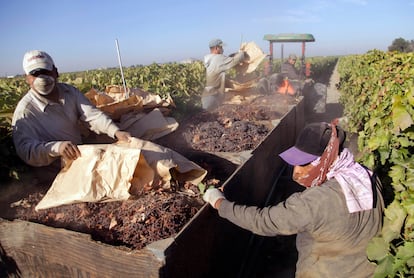
During these autumn days, the walnut and almond trees are heavy with fruit, and the work is intense: California produces 100% of the country’s walnuts and almonds, and its production also accounts for 80% of the world’s almonds. Agriculture in the state is a massive industry, with 400 varieties of crops ranging from the vegetable fields of the south to the vineyards of the north, generating billions of dollars annually. However, despite the scale of the business, there is no sense of the carefree atmosphere of prosperous times. The fields are on edge due to the looming threat of mass deportations under the incoming Donald Trump administration.
Around half of the 2.4 million farmworkers in the United States are undocumented immigrants. In California — known as the country’s breadbasket for producing a third of its vegetables and three-quarters of its fruit — that number can reach 70% in certain areas.
The president-elect made “the largest deportation operation in history” the centerpiece of his campaign. His openly stated goal is to remove millions of undocumented migrants — ranging from the official count of 11 million to as many as 25 million, the highest figure Trump himself has cited without evidence. In the months leading up to the election, much attention was paid to the immediate and long-term costs of such a policy on the U.S. economy. Now that mass deportations are more clearly on the horizon, the situation is no longer hypothetical. Warnings about the potential for a devastating deportation campaign in California predict a domino effect that could disrupt the nation’s food supply and further erode the already fragile rights of farmworkers.
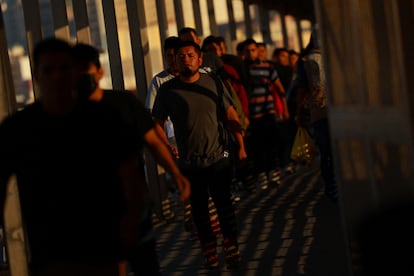
“Any plan to carry out mass deportations would be devastating for both the agricultural industry and consumers, because any disruption to the industry would drive up prices at a time when workers are already worried about inflation,” Edward Orozco Flores, faculty director of the Center for Community and Work at the University of California, Merced, tells EL PAÍS by phone.
The center, located in the heart of California’s San Joaquin Valley — the hub of the state’s agricultural —is the largest research facility of its kind in a rural area. It focuses on research related to farm labor, workers’ rights, immigrant rights, and environmental impacts. “Economists study how a single-digit change in unemployment figures can have fundamental consequences for the entire economic system. The agricultural industry would be no exception,” adds Orozco.
An increase in production costs, combined with a decrease in output due to fewer workers in the fields, would lead to higher prices for transporters and consumers, as well as agricultural exporters, who are already facing the threat of trade wars from President-elect Trump’s tariff policies, which could cut into their profit margins. Additionally, deportations would significantly affect labor supply in industries such as meatpacking and food processing.
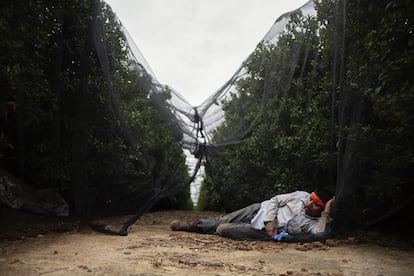
Despite all this, the eight counties that make up the San Joaquin Valley appear to have leaned toward Trump. While the vote count in California is progressing slowly, Trump is leading in all of them. “Anyone who drives down the 99 here in California will see signs from farmers supporting Trump,” says Orozco. “But their businesses depend largely on undocumented migrant workers,” he continues, pointing out an apparent contradiction.
This contradiction is not as apparent as it may seem, because while deportation threats could potentially harm business profitability, they also grant these employers considerable leverage over their employees. Farm and domestic work are the only sectors that do not guarantee the same labor rights as other industries. This situation dates back to the 1930s, when agricultural workers — predominantly minorities — were excluded from protections such as unions, child labor laws, minimum wage, and overtime pay, which are enjoyed by workers in other industries.
Orozco offers an example: “In the 2010s, there was a case at a chicken farm where workers were organizing and denouncing the conditions. Shortly afterward, there was an immigration raid at that same plant. This should alarm people — the possibility of using a mass deportation policy as a tool to discipline workers and further worsen working conditions.”
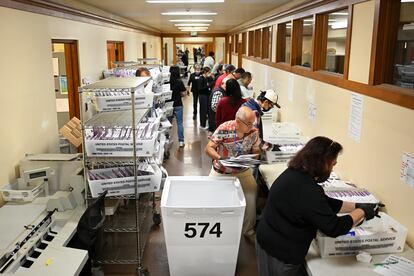
How the threat of deportation is used against migrant farmworkers is of great concern to many advocates for this community. The fact that the cost of implementing mass deportations would be astronomical — and could even trigger a recession, according to the most pessimistic forecasts — makes it much more likely that the fear of deportation will be used strategically to suppress union organizing and the search for better job opportunities. There is particular concern that the protections for farmworkers introduced by the Biden administration are now at risk.
There is already a precedent of Republican-led states suing the federal government over a rule that allows H-2A visa workers to unionize, targeting people in labor-hungry industries. These advocates also fear that the incoming Trump administration may challenge a Biden policy known as Deferred Action for Labor Enforcement, which shields undocumented immigrants who report labor violations from deportation.
With just over two months until Trump takes office for his second term, millions of workers who produce the food that feeds the nation — those who occupy one of the lowest rungs on the social ladder — are waking up every day uncertain about their future. In a few months, they might face the threat of losing their jobs or homes. In the best-case scenario, they will only become more vulnerable, and their lives will become even more precarious. It’s not just inflation — the domino effect of the mass deportation policy has more than one path.
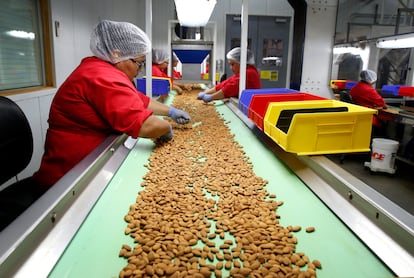
Sign up for our weekly newsletter to get more English-language news coverage from EL PAÍS USA Edition
Tu suscripción se está usando en otro dispositivo
¿Quieres añadir otro usuario a tu suscripción?
Si continúas leyendo en este dispositivo, no se podrá leer en el otro.
FlechaTu suscripción se está usando en otro dispositivo y solo puedes acceder a EL PAÍS desde un dispositivo a la vez.
Si quieres compartir tu cuenta, cambia tu suscripción a la modalidad Premium, así podrás añadir otro usuario. Cada uno accederá con su propia cuenta de email, lo que os permitirá personalizar vuestra experiencia en EL PAÍS.
¿Tienes una suscripción de empresa? Accede aquí para contratar más cuentas.
En el caso de no saber quién está usando tu cuenta, te recomendamos cambiar tu contraseña aquí.
Si decides continuar compartiendo tu cuenta, este mensaje se mostrará en tu dispositivo y en el de la otra persona que está usando tu cuenta de forma indefinida, afectando a tu experiencia de lectura. Puedes consultar aquí los términos y condiciones de la suscripción digital.









































